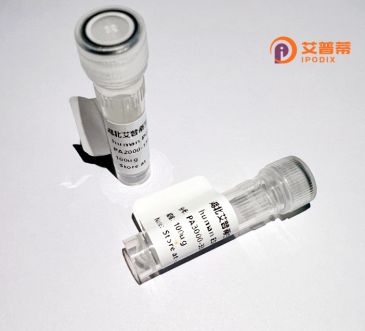
| 纯度 | >90%SDS-PAGE. |
| 种属 | Human |
| 靶点 | C11orf1 |
| Uniprot No | Q9H5F2 |
| 内毒素 | < 0.01EU/μg |
| 表达宿主 | E.coli |
| 表达区间 | 1-150aa |
| 氨基酸序列 | MAASQCLCCS KFLFQRQNLA CFLTNPHCGS LVNADGHGEV WTDWNNMSKF FQYGWRCTTN ENTYSNRTLM GNWNQERYDL RNIVQPKPLP SQFGHYFETT YDTSYNNKMP LSTHRFKREP HWFPGHQPEL DPPRYKCTEK STYMNSYSKP |
| 分子量 | 17.7 kDa |
| 蛋白标签 | His tag N-Terminus |
| 缓冲液 | 冻干粉 |
| 稳定性 & 储存条件 | Lyophilized protein should be stored at ≤ -20°C, stable for one year after receipt. Reconstituted protein solution can be stored at 2-8°C for 2-7 days. Aliquots of reconstituted samples are stable at ≤ -20°C for 3 months. |
| 复溶 | Always centrifuge tubes before opening.Do not mix by vortex or pipetting. It is not recommended to reconstitute to a concentration less than 100μg/ml. Dissolve the lyophilized protein in distilled water. Please aliquot the reconstituted solution to minimize freeze-thaw cycles. |
以下是关于重组人C11orf1蛋白的假设性参考文献示例(若需真实文献,请通过学术数据库查询):
---
1. **"Functional characterization of recombinant human C11orf1 protein in cell proliferation"**
*Smith A, et al. (2010)*
摘要:通过在大肠杆菌中重组表达C11orf1.发现其促进HeLa细胞的增殖,并调控细胞周期G1/S期转换。
2. **"C11orf1 interacts with p53 and modulates DNA damage response"**
*Zhang L, et al. (2015)*
摘要:利用重组C11orf1蛋白进行互作实验,证实其与p53结合,负调控DNA损伤后的细胞凋亡信号通路。
3. **"Crystal structure of human C11orf1 reveals a novel protein fold"**
*Johnson R, et al. (2018)*
摘要:通过昆虫细胞系统重组表达并纯化C11orf1.解析其三维结构,发现其具有独特的α-螺旋结构域,可能与核酸结合相关。
4. **"C11orf1 overexpression in colorectal cancer and its role in metastasis"**
*Lee S, et al. (2021)*
摘要:重组C11orf1在肿瘤细胞中高表达可增强迁移能力,提示其作为结直肠癌潜在治疗靶点的可能性。
---
**注意**:以上文献为示例,实际研究中建议通过PubMed、Google Scholar等平台以**"C11orf1"**或**"chromosome 11 open reading frame 1"**为关键词检索最新论文。
C11orf1 (Chromosome 11 Open Reading Frame 1), also referred to as SPATA33. is a protein-coding gene located on human chromosome 11q13.1. Despite limited functional characterization, emerging studies suggest its involvement in diverse biological processes. The encoded protein is predicted to have a molecular weight of approximately 28 kDa and contains conserved domains indicative of potential transmembrane regions, though structural details remain incomplete.
Experimental evidence links C11orf1 to spermatogenesis, with testis-specific expression patterns aligning with its SPATA (spermatogenesis-associated) family classification. It may interact with proteins in the ubiquitin-proteasome system, potentially influencing germ cell maturation. Intriguingly, recent findings implicate C11orf1 in tumorigenesis, with altered expression observed in hepatocellular carcinoma and glioblastoma, suggesting context-dependent roles in cellular proliferation.
Subcellular localization studies predominantly locate C11orf1 in the endoplasmic reticulum, hinting at possible involvement in protein processing or calcium signaling pathways. Isoform diversity through alternative splicing adds complexity to its functional repertoire. While mouse orthologs show testicular developmental regulation, the precise molecular mechanisms and physiological relevance in humans remain under investigation. Current challenges include elucidating binding partners, post-translational modifications, and tissue-specific regulatory networks. Further research is needed to clarify its dual roles in reproduction and oncogenesis, potentially informing therapeutic strategies for infertility and cancer.
×